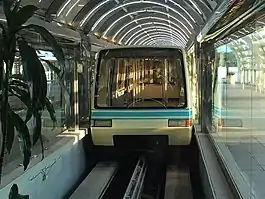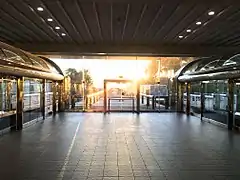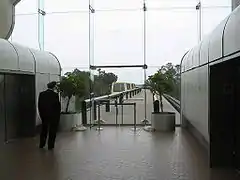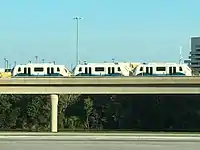Orlando International Airport People Movers
The Orlando International Airport People Movers are a set of automated guideway transit (AGT) people mover systems operating within Orlando International Airport. The four original people mover systems connect the airport's main terminal to four satellite airside concourses.[1] A fifth AGT people mover system was installed in 2017 to connect the main terminal with the airport's new Intermodal Terminal.
| Orlando International Airport People Movers | |
|---|---|
 Train at Airside 4 station | |
| Overview | |
| Locale | Orlando International Airport |
| Stations | 10 |
| Service | |
| Type | Automated guideway transit |
| Services | 5 |
| Rolling stock |
|
| History | |
| Opened | 1981 (Airsides 1 & 3) 1990 (Airside 4) 2000 (Airside 2) 2017 (Intermodal Terminal) |
| Technical | |
| Character | Serves sterile parts of the airport |
| Highest elevation | Elevated |
Airside systems
The four currently operating systems connect the main terminal with the airside concourses.[1] The west two lines (Airsides 1 and 3) opened with the airport terminal in 1981. Airside 4 and its line were built later in 1990, and Airside 2 and its line began operation in 2000. The airside systems are similar to the Tampa International Airport People Movers.
Each line consists of two guideways that carry a three-car train each. The west two lines were two car trains until 1999 when they were refurbished and 1 new additional C-100 vehicle was added to each train. The trains shuttle back and forth between the terminal and their respective airsides. The stations at the main terminal and the airsides use the Spanish solution: passengers board on an island platform between the two guideways and disembark on side platforms.
Since Airside 4 is the primary concourse for international flights, its system is set up so that when international flights arrive, terminal-bound passengers are not “secure”, while airside-bound passengers have gone through security screening. Only one set of doors are open at a time, and trains receive a security inspection before boarding secure departing passengers to the airside. This eliminates the need for international arriving passengers to go through additional security screening before heading to the main terminal.[2]
Currently, only Airside 2 and 4 systems use Bombardier CX-100 vehicles. Airside 1 and 3 system's Adtranz C-100 vehicles were replaced with Mitsubishi Crystal Mover Urbanismo-22 vehicles in 2017.[3] Airsides 2 and 4's vehicles are not being replaced since those systems were built much later.[4]
 Terminal Station platform for the Airside 2 APM.
Terminal Station platform for the Airside 2 APM. Terminal Station platform for the Airside 3 APM with the original C-100 fleet.
Terminal Station platform for the Airside 3 APM with the original C-100 fleet..jpg.webp) Bombardier CX-100 arriving at the terminal.
Bombardier CX-100 arriving at the terminal..jpg.webp) New Mitsubishi Crystal Mover Urbanismo-22 on the Airside 3 APM.
New Mitsubishi Crystal Mover Urbanismo-22 on the Airside 3 APM..jpg.webp) New Mitsubishi Crystal Mover vehicle interior.
New Mitsubishi Crystal Mover vehicle interior.
Intermodal Terminal system

Orlando International Airport | |||||||||||||||||||||||||||||||||||||||||||||||||||||||||||||||||||||||||||||||||||||||||||||||||||||||||||||||||||||
|---|---|---|---|---|---|---|---|---|---|---|---|---|---|---|---|---|---|---|---|---|---|---|---|---|---|---|---|---|---|---|---|---|---|---|---|---|---|---|---|---|---|---|---|---|---|---|---|---|---|---|---|---|---|---|---|---|---|---|---|---|---|---|---|---|---|---|---|---|---|---|---|---|---|---|---|---|---|---|---|---|---|---|---|---|---|---|---|---|---|---|---|---|---|---|---|---|---|---|---|---|---|---|---|---|---|---|---|---|---|---|---|---|---|---|---|---|---|
| |||||||||||||||||||||||||||||||||||||||||||||||||||||||||||||||||||||||||||||||||||||||||||||||||||||||||||||||||||||
A fifth line was recently installed to connect the main terminal with the airport's Intermodal Terminal, which opened in late 2017. The Intermodal Terminal includes additional parking as well as a rail station for future use by Brightline and SunRail. This line also uses Mitsubishi Crystal Movers, although they heavily differ in appearance than those used for Airsides 1 and 3.[5]
References
| Wikimedia Commons has media related to Orlando International Airport People Mover. |
- "Getting Around MCO". Orlando International Airport. Retrieved 16 July 2017.
- "Frequently Asked Questions". Orlando International Airport. Retrieved 16 July 2017.
- Storey, Ken. "Orlando International Airport retires its original people mover trams after 35 years". Orlando Weekly. Retrieved 16 July 2017.
- "Terminal-Gate Shuttle Replacement". Orlando International Airport. Archived from the original on 10 September 2017. Retrieved 16 July 2017.
- "Mitsubishi Heavy Industries America Receives Order for Three Automated People Mover (APM) Systems at Orlando International Airport". PR Newswire. Retrieved 16 July 2017.